Pool Filter Sand Channeling
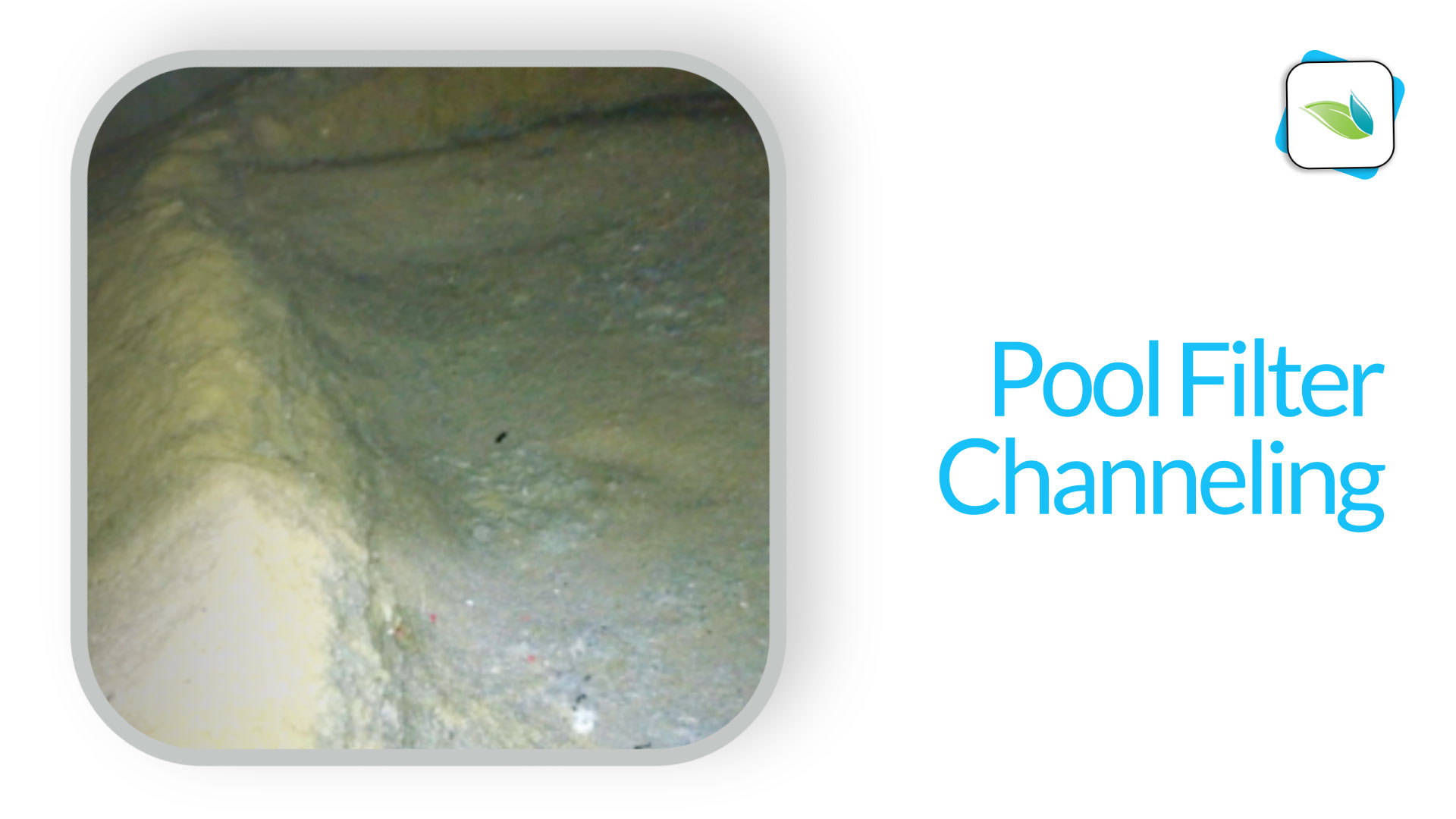
Seasoned pool operators know the triad of great pool water: filtration, circulation, and chemistry. Filter channeling is a problem that undermines the efficacy of sand filters. Let's learn what channeling is and what can be done to fix and prevent it.
Covered in this article:
- What can cause channeling in a sand filter?
- Sand filtration and particle screening
- Symptoms of filter channeling
-
- Abnormal backwash cycles
- Sand ridges
- Cloudy pool water
-
- How to fix a filter channeling problem
- Orenda filter purge
- Replacing sand in pool filter
- Conclusion
Even when filter sand becomes fouled with grease, non-living organics, oils, or calcification, water still needs to find a way to push through the sand bed. The more fouled the filter, the more water has to find a path of least resistance. This results in water finding weaker parts of the congealed sand bloc, creating a channel, or tunnel. This new pathway allows water to rush through the filter and bypass the screening that sand filters provide.
In other words, a channel is a shortcut where water can bypass most of the sand in the filter. This allows larger particles to flow past the sand rather than being removed as they should be. Channeling is surprisingly common in high-use commercial swimming pools.
What can cause channeling in a sand filter?
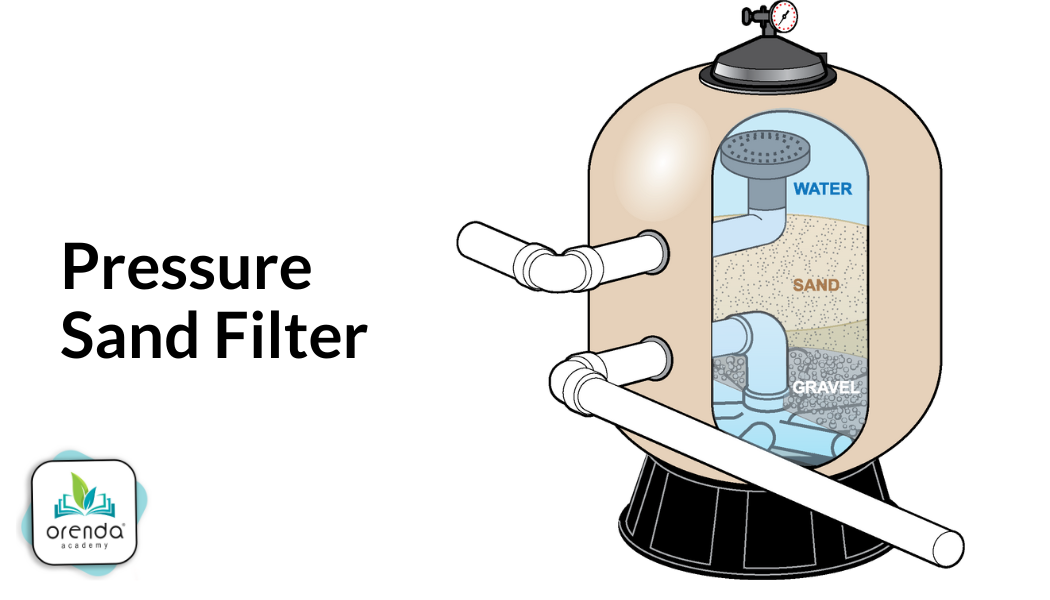
Channeling is a problem specific to pool sand filters. When the sand (or crushed glass) media captures enough sticky material, its physical properties change, and its screening ability is reduced.
Normally, this material is non-living organic waste, calcification caused by a high-LSI violation of some kind, or maybe a synthetic material that got introduced to the pool (like a polymer clarifier or flocculant). Regardless of what compromises the sand, the sand's ability to screen particles out of water is reduced. It creates uneven pressure spots where water is trying to force its way through the media.
Related: Organic Waste and Carbon Management (Pillar 2)
Eventually, these uneven pressure spots in the filter can form an opening, called a channel. When the channel opens up enough, unfiltered water can flow through it and bypass the majority of the sand. The water rushes straight to the filter laterals at the bottom and continues on through circulation. Cloudy pool water is almost inevitable at that point.
A common form of filter channeling is when water seeps around the edges of a sand filter tank, avoiding the sand bed almost entirely. This is especially evident in pressure sand filters after backwashing. This article includes pictures and videos of two examples.
Sand filtration and particle screening
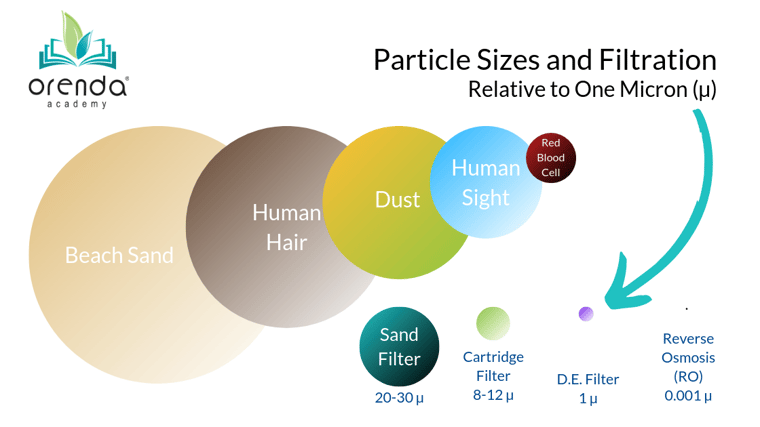
Sand filters have the lowest screening capacity of the three most common filter types in the pool business. Sand filters can capture particles as small as 20-30 Microns (µ). Compared to cartridge filters (8-12 µ) or Diatomaceous Earth (D.E.) filters (down to 1 µ).
That said, sand filters still pull out particles smaller than the naked eye can see, and are capable of maintaining beautifully clean and clear water. Most competition pools in the United States and abroad have sand filters, as it is the oldest, proven filtration technology on the market. Regenerative DE filters are growing in popularity, but due to the higher costs, they are not as common as sand filters.
Sand filters are comparatively easy to manage. They do not require too much cleaning, because sand filters can be backwashed. Backwashing is when the plumbing is reversed so water is pumped in the reverse direction, from the laterals up through the sand, and out to waste.
Symptoms of filter channeling
The results of channeling in a sand filter include abnormal backwash cycles, elevated ridges around the perimeter of the sand bed, and cloudy pool water. This is because water has found a preferred path of least resistance, bypassing the sand.
Abnormal backwashing cycles
Commercial pool operators sometimes call us to ask about filtration. One symptom we hear often is the operator is regularly backwashing, but it's not producing a noticeable change in filter pressure. Normally backwashing removes contaminants and creates a reducing in filter pressure when normal circulation is resumed. When this reduction in filter pressure is not evident, there could be a channeling issue within the sand bed.
Another symptom is if the backwash water looks relatively clean. A normal backwash will have brownish, dirty water. It's supposed to be removing crud that is stuck in the sand...but if there is a channeling issue, the backwash water is likely bypassing the sand bed (for the most part), and it will be pretty clean.
Backwashing with minimal results should raise a red flag.
Sand ridges
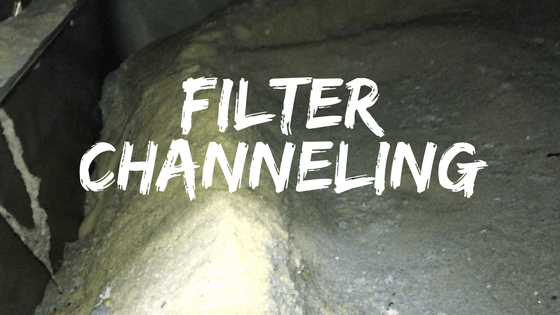
If you suspect your filter is channeling, shut the pump off and look in the filter. There could be pockets or tunnels through the sand, but more likely, ridges of raised sand around the inside edges. See the picture above.
These sand ridges are formed when backwash water flows around the sand bed along the sides of the filter tank itself. The middle of the sand bed, in this situation, should look fairly settled with lots of debris on top. Water is not pushing through the middle anymore, because it has a wide open channel around the perimeter of the filter tank.
It should be noted that these ridges are found in pressure sand filters, not vacuum sand filters. They are a dead giveaway of channeling, but are normally only seen in large commercial sand filters. Residential filters tend to not show such obvious ridges or holes.
Cloudy water
Obviously, cloudy water can be caused by a myriad of factors...channeling is just one of them. It can't hurt to take a look at the filter and see what's going on. Remember that water quality requires circulation, filtration, and chemistry.
Related: What causes cloudy pool water?
How to fix a filter channeling problem
The first step to fixing a pool filter channeling issue is to understand what's causing it. Is it calcification, perhaps from a high LSI? Is it oils and organics? Is it calcium phosphate? Is it a combination of these factors? Once the reason has been identified, a pool operator should address the contamination fouling the filter head-on.1
If your pool has high calcium or evidence of carbonate scale, calcium could be part of the problem. If you use polymer-based products like synthetic clarifiers, those polymers can contribute to the clumping too. So can aluminum-based products like flocculants and the dust from phosphate removers.
Once the cause is identified, you can decide how you want to handle the problem. There are basicaly two options: chemically clean (or purge) the filter, and replacing the sand itself.
The Orenda Filter Purge™
Before deciding to change the sand, which is a costly and labor-intensive process, consider chemically purging the filter instead. It's an affordable way to remove organic contamination and refurbish the sand. If a channeling problem persists, it will be easier to problem solve once you get those non-living organics and gunk out of the equation.
Replacing sand in pool filter(s)
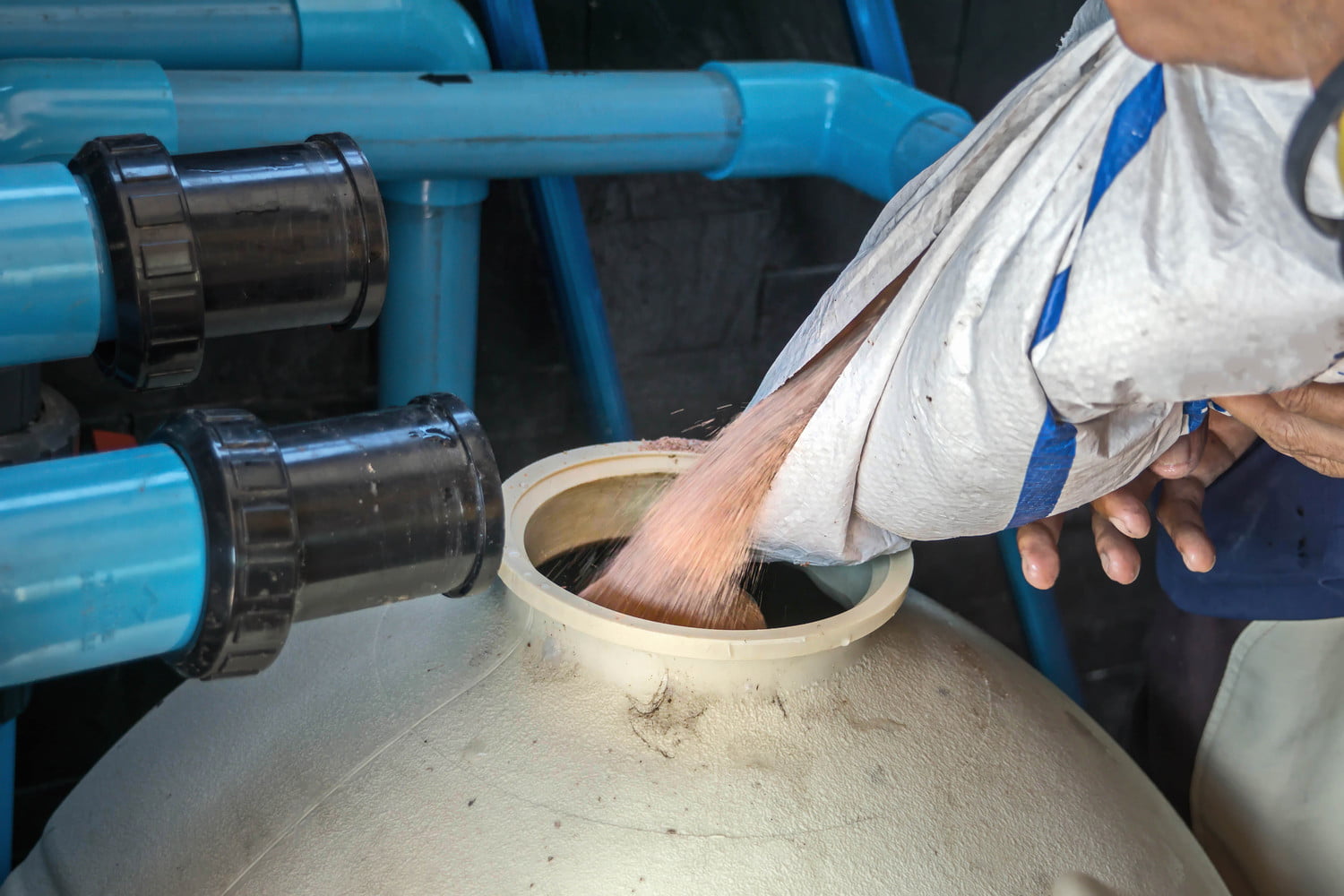
It has long been believed that filter sand wears down over time. The notion is that friction and pressure round off the edges of the sand particles, which reduce their screening ability. That belief has been the reason for so many sand changes in commercial pool filters.
We believed it too, until we saw the quality of the 11-year old sand that we had just refurbished with our filter purge. We could not tell the difference between the cleaned, old sand and the new sand out of the bag.
The cost to replace sand in a pool filter varies, depending on the size of the filter and how accessbile it is. Nowadays, pool service companies can rent vacuum trucks, which reduces the labor and time involved. For years, sand was manually scooped out by hand, and the rest of it sucked out with a shop vacuum. In either case, the labor and time involved makes it a costly process.
In our opinion, sand changes are very rarely needed. Some circumstances make it unavoidable, such as calcium phosphate scale, or calcium sulfate scale. If you have these conditions, chemical refurbishment will not fix the issue, and it's time to replace the sand.2
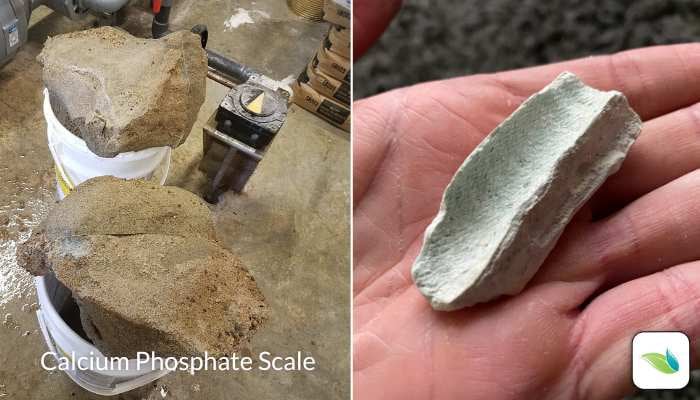
If and when a sand change is necessary, we recommend considering crushed glass media instead of sand. In our experience, we have seen an improvement in water quality and backwashing removal when crushed glass is used in lieu of sand.
Conclusion
Pool filter sand replacements are rarely necessary, but sand filters can become fouled quickly. The more the pool is used, the more oils and organics will be stuck in the filter over time. It is inevitable, and it means the filter is capturing contamination. It's doing its job.
The issue is when the contamination becomes severe enough that it congeals the sand together, forcing water to break through and create channels, so it can find the path of least resistance through the sand bed. Channeling leads to cloudy water and overall bad water quality. To resolve this, consider purging the filter every couple of years (depending on how heavily used the pool is).
1 In our experience, non-living organics and oils have been a leading cause in every sand filter purge we have done. At the time of updating this, hundreds of commercial sand filters have been purged using our process, either by us, our reps, or our trained customers in the field. The process is highly effective, and refurbishes fouled sand into cleaned sand that feels indistinguishable from new sand. Learn our filter purge process here.
2 We sincerely hope you do not have calcium phosphate or calcium sulfate scale in your filter. These are severe problems that chemicals (including acid) are not able to fix. Regular calcification is calcium carbonate––a consequence of a high LSI, often accelerated by use of calcium hypochlorite chlorine. Calcium carbonate is relatively easy to manage, as diluted acid can dissolve it rapidly, and our filter purge process removes most of it as well. Calcium phosphate, however, can turn a sand bed into something as hard as concrete. Some of our commercial dealers have shown us photos (like the one above) of blocks of sand that had to be jackhammered apart, after cutting open the filter. So not only was the filter sand replaced, the filter itself had to be cut apart and replaced. These two scale problems can be avoided by maintaining low phosphate levels and avoiding prolonged use of sulfate-based products (like sodium bisulfate, sulfuric acid, potassium monopersulfate, sodium thiosulfate, copper sulfate algaecide, etc.).
